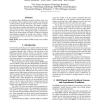Free Online Productivity Tools
i2Speak
i2Symbol
i2OCR
iTex2Img
iWeb2Print
iWeb2Shot
i2Type
iPdf2Split
iPdf2Merge
i2Bopomofo
i2Arabic
i2Style
i2Image
i2PDF
iLatex2Rtf
Sci2ools
INTERSPEECH
2010
2010
Roles of the average voice in speaker-adaptive HMM-based speech synthesis
In speaker-adaptive HMM-based speech synthesis, there are a few speakers whose synthetic speech sounds worse than that of other speakers, despite having the same amount of adaptation data from within the same corpus. This paper investigates these fluctuations in quality and found that as mel-cepstral distance from the average voice becomes larger, the MOS scores generally become worse. Although the negative correlation obtained is not strong enough, this helps us improve the training and adaptation strategies for average voice models. Furthermore we remark that this correlation is strongly linked to "vocal attractiveness."
Average Voice | Average Voice Models | INTERSPEECH 2010 | Signal Processing | Speaker-adaptive Hmm-based Speech |
| Added | 18 May 2011 |
| Updated | 18 May 2011 |
| Type | Journal |
| Year | 2010 |
| Where | INTERSPEECH |
| Authors | Junichi Yamagishi, Oliver Watts, Simon King, Bela Usabaev |
Comments (0)

